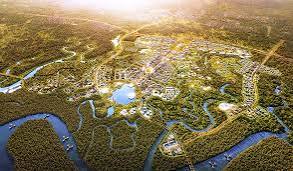The country embarked on a project to develop a new capital city known as Nusantara, to be situated in Borneo. Developed by PT PP (Persero) and PT Wijaya Karya the $52bn plan is proposed to address severe overcrowding nd pollution, which affects Jakarta – one of the most populated cities in the world.
Completion date
Originally planned for the official launch on August 17, 2024, Nusantara is intended to be an exemplary city that connects contemporary technology to sustainable growth. Jakarta which is the current capital city in Indonesia is also associated with a number of problems. Jakarta is one of the most congested, polluted, and experiencing land subsistence with over 10 million individuals and over-extraction of water causes the ground to sink. The city fails to provide adequate infrastructure because of its constant expansion as well as it is prone to flooding. Such a policy is expected to decentralize human and economic activities in the country and lead to the balanced development of the archipelago by relieving pressure on the capital city of Jakarta.

Its name, Nusantara, which translates to ‘archipelago’ in Old Javanese, is situated in East Kalimantan province of Borneo Island which is the third largest island on the planet. This is viewed as geographically favorable since it is close to the geographic midpoint of Indonesia, thus reaching a broader population. The Nusantara master plan for the city focuses on combining governmental buildings, homes, and businesses while being environmental friendly. It will be built incrementally with the first being aimed at creating basic administrative structures and the foundation.
Scope
The design focuses on sustainability and climate change aspects like green areas, renewable resources and smart city solutions to make Alexandria City a desirable and sustainable living environment. Thus, the development of Nusantara is not only about lightening the burden of Jakarta but also in prioritizing and encouraging economic growth and investment in the less developed areas of Indonesia. Through the development of the new economic centers in Borneo, the government seeks to facilitate the flow of both domestic and foreign investments targeted at enhancing economic growth and creating more jobs.
This project is estimated to produce millions of jobs in both the construction phase and the post construction phase encompassing several fields such as construction, services, and technology among others. The principle of sustainable environment is a principle that has been upheld throughout the formation of Nusantara. The environment of the city is also cared for since the city is planned in a way that it would have a lower carbon footprint and would respect the unique nature of Borneo. Subjects of significant size are to be set as gardens, and there would be certain limitations to reduce the overall effects on the environment. In this regard, the city will tap solar and hydropower to ensure adequate energy provision in the nation. Alas, despite this vision towards Nusantara, it is not smooth sailing for this project.
Construction cost
To mobilize resources for financing the $52 billion required for development, it is a daunting task for any country, and therefore attracting the right amount of investment is of paramount importance. However, the development should not harm the original inhabitants of Borneo or the environment in which they live and it should be adequately planned and implemented. Nonetheless, the Nusantara project is an ambitious move towards solving Indonesia’s problems of urban development as well as engine of balanced growth. If successful, it has the potential not only of changing the profile of Borneo but also becoming a model of how future city planning should be done in the 21st century.
In conclusion, Nusantara is an example of an Indonesian country that embraces progressive ideas for metropolitan city planning. Because of this effort in establishing a new capital that embraces sustainability and resilience, Indonesia is leading to a balanced and better future for the several Indonesian population groups. It will be keenly observed as the project develops as it offers one way that nations can meet the multifaceted demands of growth in urban centers and the conservation of the planet’s environment.
Read also Capital city of Nusantara: A green oasis in Indonesia’s future
Read also Indonesian Consortium Initiates $1.3 Billion Project in New Capital City
